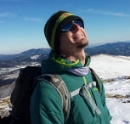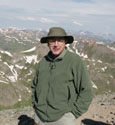Slow down your pace. Pace at elevation should be a ton slower than at lower elevations. If you cannot breath, and you feel like you have to stop every 20 feet, then slow down your pace. If your pace become a walking dead shuffle, then you might need to turn around.
Also, as others have mentioned, breath deeper. This gets you more oxygen. But, also, deep breaths push out the CO2 from deep in your lungs.
Altitude Sickness Question
Forum rules
- This is a mountaineering forum, so please keep your posts on-topic. Posts do not all have to be related to the 14ers but should at least be mountaineering-related.
- Personal attacks and confrontational behavior will result in removal from the forum at the discretion of the administrators.
- Do not use this forum to advertise, sell photos or other products or promote a commercial website.
- Posts will be removed at the discretion of the site administrator or moderator(s), including: Troll posts, posts pushing political views or religious beliefs, and posts with the purpose of instigating conflict within the forum.
-
rob runkle

- Posts: 802
- Joined: 6/12/2006
- 14ers: 58 2
- 13ers: 41
- Trip Reports (51)
-
AprilForever
- Posts: 24
- Joined: 2/6/2013
- 14ers: 3
- Trip Reports (0)
Re: Altitude Sickness Question
Ok, been forever since I've posted here, been way too much going on... Anyways...
About Ibuprofen: Speaking as a nurse, I really would not recommend taking it during the climb. 1. You run a risk of major stomach pains if not taken with enough food. 2. Increased risk of bleeding: you fall, you already can bleed, internally or externally. Adding a medicine which accentuates bleeding will not likely be a good idea. 3. I have no idea how this would even help with altitude sickness.
About Ginko: Don't for same reasons of bleeding. It seems to increase bleeding risk, so.... Just don't. Or, do so at your own risk, we are all the master of our own ship.
I am from Florida, so, when I get to go to Colorado, I always get dizziness and headaches, even at Denver, which worsen when I get higher. Things get better the longer I am there. Don't do what I did and climb Elbert when you've only been there about a day and a half. I summited, but, it was not fun. I get a crazy headache when I stop when climbing 14ers. This seems to be because my heart is still pumping hard, but the extra blood isn't needed, so, I just get a headache from it. Anyways, hope your next climb goes better!
About Ibuprofen: Speaking as a nurse, I really would not recommend taking it during the climb. 1. You run a risk of major stomach pains if not taken with enough food. 2. Increased risk of bleeding: you fall, you already can bleed, internally or externally. Adding a medicine which accentuates bleeding will not likely be a good idea. 3. I have no idea how this would even help with altitude sickness.
About Ginko: Don't for same reasons of bleeding. It seems to increase bleeding risk, so.... Just don't. Or, do so at your own risk, we are all the master of our own ship.
I am from Florida, so, when I get to go to Colorado, I always get dizziness and headaches, even at Denver, which worsen when I get higher. Things get better the longer I am there. Don't do what I did and climb Elbert when you've only been there about a day and a half. I summited, but, it was not fun. I get a crazy headache when I stop when climbing 14ers. This seems to be because my heart is still pumping hard, but the extra blood isn't needed, so, I just get a headache from it. Anyways, hope your next climb goes better!
Blond is the color of my true love's hair,
Her lips are like a rose so fair...
Her lips are like a rose so fair...
-
AyeYo

- Posts: 449
- Joined: 9/25/2015
- 14ers: 13
- 13ers: 13 3
- Trip Reports (0)
Re: Altitude Sickness Question
This.rob runkle wrote:Slow down your pace. Pace at elevation should be a ton slower than at lower elevations. If you cannot breath, and you feel like you have to stop every 20 feet, then slow down your pace. If your pace become a walking dead shuffle, then you might need to turn around.
Go fast and stop often or go slow and steady. If you're going slow AND needing to take frequent breaks, you might be just having an off day.
-
rob runkle

- Posts: 802
- Joined: 6/12/2006
- 14ers: 58 2
- 13ers: 41
- Trip Reports (51)
Re: Altitude Sickness Question
If you are going slow, and needing to take frequent breaks, you might just be in the mountains.AyeYo wrote:This.rob runkle wrote:Slow down your pace. Pace at elevation should be a ton slower than at lower elevations. If you cannot breath, and you feel like you have to stop every 20 feet, then slow down your pace. If your pace become a walking dead shuffle, then you might need to turn around.
Go fast and stop often or go slow and steady. If you're going slow AND needing to take frequent breaks, you might be just having an off day.
Having said that, there is certainly a point when you are going too slow. Hard to determine what that pace is, so that's why I didn't expound on my initial post. What is too slow? For me, it means that other people are blazing by me, and that I need to stop more than every 50-100 ft of elevation gain. Usually I'm no where near that level though.
Also, another thing I would highly recommend is doing "standing breaks." When you take a long sitting break, it is much harder to get going again. I would limit sitting breaks to 2 or maybe 3 for the ascent portion of the hike, maybe one nice one on top, if the weather is good, and another 1 on the descent. Standing breaks are as many as you need, as long as you feel you are still making good forward progress.
-
aweskamp

- Posts: 139
- Joined: 6/21/2013
- 14ers: 30
- 13ers: 1
- Trip Reports (6)
Re: Altitude Sickness Question
I've never heard that ibuprofen can globally increase risk of bleeding, except maybe gastric bleeding, as you alluded to. I think you're thinking of aspirin, which inhibits platelet aggregation.AprilForever wrote: 1. You run a risk of major stomach pains if not taken with enough food. 2. Increased risk of bleeding: you fall, you already can bleed, internally or externally. Adding a medicine which accentuates bleeding will not likely be a good idea. 3. I have no idea how this would even help with altitude sickness.
And yes, ibuprofen has been shown in multiple studies to reduce the incidence of AMS if taken prophylactically. I'm not sure if it would've helped the OP based on the info given, but it certainly could help others coming to altitude from sea level.
Here's a Stanford article link outlining the research: https://med.stanford.edu/news/all-news/ ... -find.html" onclick="window.open(this.href);return false;
The original study is published in the Annals of Emergency Medicine if anyone wants to drop $35 to check it out.
-
rpdawes

- Posts: 428
- Joined: 7/26/2013
- 14ers: 18 1
- 13ers: 46 2
- Trip Reports (7)
Re: Altitude Sickness Question
After a summit of twelve 14ers (1st at age of 73 and the latest at 76), I have never experienced an altitude sickness. So I believe that my very slow pace helps me a lot with my breathing performance. I usually hike at a speed of 1.0 to 2.0 mph from a trailhead up to 12k feet level depending on a steepness of a slope and afterward slow down to 0.5 mph all the way to a summit. Always listen to my body for any unusual change. I sometimes take a Aleve or Tylenol pill prior to climbing. Also keep hydrated.
-
AyeYo

- Posts: 449
- Joined: 9/25/2015
- 14ers: 13
- 13ers: 13 3
- Trip Reports (0)
Re: Altitude Sickness Question
aweskamp wrote:I've never heard that ibuprofen can globally increase risk of bleeding, except maybe gastric bleeding, as you alluded to. I think you're thinking of aspirin, which inhibits platelet aggregation.AprilForever wrote: 1. You run a risk of major stomach pains if not taken with enough food. 2. Increased risk of bleeding: you fall, you already can bleed, internally or externally. Adding a medicine which accentuates bleeding will not likely be a good idea. 3. I have no idea how this would even help with altitude sickness.
And yes, ibuprofen has been shown in multiple studies to reduce the incidence of AMS if taken prophylactically. I'm not sure if it would've helped the OP based on the info given, but it certainly could help others coming to altitude from sea level.
Here's a Stanford article link outlining the research: https://med.stanford.edu/news/all-news/ ... -find.html" onclick="window.open(this.href);return false;
The original study is published in the Annals of Emergency Medicine if anyone wants to drop $35 to check it out.
Only 86 people, a single test, and they're drawing meaningful conclusions from it? I love medical "research".Of the 44 participants who received ibuprofen, 19 (43 percent) suffered symptoms of altitude sickness, whereas 29 of the 42 participants (69 percent) receiving placebo had symptoms, according to the study. In other words, ibuprofen reduced the incidence of the illness by 26 percent.
-
Arndorfer

- Posts: 39
- Joined: 7/23/2015
- 14ers: 12
- 13ers: 3
- Trip Reports (0)
Re: Altitude Sickness Question
I don't think what you describe sounds like altitude sickness. However, for general knowledge let me share my experience. Over 10 years ago I used to get headaches and nausea in the morning on day ski trips in Summit county to the point of vomiting on the slopes. Even though I live in Fort Collins, I attributed it to the quick drive and then lifts to 10k'+, since I never have suffered the same symptoms on hikes up to 13,500'. My doctor suggested gingko drops daily for a week prior to ski trips. Since taking those drops I have never had another bout of nausea. Good luck.
-
asbochav

- Posts: 137
- Joined: 8/26/2007
- 14ers: 31 1
- 13ers: 3
- Trip Reports (0)
Re: Altitude Sickness Question
A diagnosis of AMS [Acute Mountain Sickness] requires a recent ascent, and headache. Plus one or more symptoms in the following four categories: gastrointestinal, fatigue or weakness, dizziness or lightheadedness, difficulty sleeping. Difficulty breathing is not a part of it. The OP specifically said no headache. So not AMS.
http://www.high-altitude-medicine.com/A ... ouise.html" onclick="window.open(this.href);return false;
Here's a link to a study on pursed lip breathing. No medications or special gear needed! If anyone can find a more recent study, please let us know!
http://link.springer.com/article/10.100 ... 008-0241-3" onclick="window.open(this.href);return false;
Roger.
http://www.high-altitude-medicine.com/A ... ouise.html" onclick="window.open(this.href);return false;
Here's a link to a study on pursed lip breathing. No medications or special gear needed! If anyone can find a more recent study, please let us know!
http://link.springer.com/article/10.100 ... 008-0241-3" onclick="window.open(this.href);return false;
Roger.
Eppur si muove
Clapton is God
Clapton is God
-
scottaskinger

- Posts: 130
- Joined: 6/28/2011
- 14ers: 39
- 13ers: 7
- Trip Reports (3)
Re: Altitude Sickness Question
Lots of info here, maybe conflicting, confusing and pretty tough to pin down. Without telling you what is right for your body, here are my experiences to help me avoid feeling shitty (whether it is AMS, nausea, headache or whatever you want to call it).
Typically, I'm flying in from Chicago, gearing up and driving to the TH that same day. I will try to get a short hike in that day or at least get well prepared and ready to hit the trails first thing in the morning.
I perform best and suffer the least when:
1. I try to be in top physical condition. I do cardio (aerobic and anaerobic) and strength training. I tend to focus on movements that match what I would be doing hiking and climbing. For cardio I do stair machines and walking on an inclined treadmill (between 15 to 30 degrees) sometimes with a weighted backpack. For strength training I do things like "step ups" on a bench with weights, lunges and also some upper body.
2. I drink lots of water the night before, when I wake up and on the way to the TH. I drink water BEFORE I'm thirsty. I gauge whether I'm drinking enough water by how much I'm peeing. If I'm not peeing while I'm hiking up a mountain, I'm not drinking enough water. I like to use wide mouth Nalgene bottles versus something like a Camelbak water bladder. I find that I don't drink enough water if I'm trying to suck it out of a bladder and gasping for air at the same time. I always make sure to have enough water and plan for refills. I often bring 4L of water with me for a 14er day hike (seems to be more than most people) and/or I'm careful to plan a resupply at my last water source before getting too high up the mountain.
I also use Nuun electrolytes in my water to help avoid cramping and make me feel better in general. The water also tastes better and I tend to drink more.
3. I eat a little something if I take a rest or water break...even if I'm not really hungry. If I'm not using Nuuns (above) in my water I might eat a pack of honey stingers (electrolytes). I find it critical to eat/drink consistently throughout the day BEFORE I feel shitty to make sure that I don't feel shitty.
4. I pace myself and push myself to levels that make sense for me. The first day hiking after arriving from Chicago is my easy day (i.e. one peak, 8 mile RT), but even an easy hike is hard while acclimating. By day 2 I'm ready to take on bigger challenges (i.e. 2 or more peaks, ridge climb, 15 miles, etc.). Putting in the effort on day 1 and following my routine above works well for me to be ready and capable for bigger days the rest of the trip.
Good Luck!
Scott
Typically, I'm flying in from Chicago, gearing up and driving to the TH that same day. I will try to get a short hike in that day or at least get well prepared and ready to hit the trails first thing in the morning.
I perform best and suffer the least when:
1. I try to be in top physical condition. I do cardio (aerobic and anaerobic) and strength training. I tend to focus on movements that match what I would be doing hiking and climbing. For cardio I do stair machines and walking on an inclined treadmill (between 15 to 30 degrees) sometimes with a weighted backpack. For strength training I do things like "step ups" on a bench with weights, lunges and also some upper body.
2. I drink lots of water the night before, when I wake up and on the way to the TH. I drink water BEFORE I'm thirsty. I gauge whether I'm drinking enough water by how much I'm peeing. If I'm not peeing while I'm hiking up a mountain, I'm not drinking enough water. I like to use wide mouth Nalgene bottles versus something like a Camelbak water bladder. I find that I don't drink enough water if I'm trying to suck it out of a bladder and gasping for air at the same time. I always make sure to have enough water and plan for refills. I often bring 4L of water with me for a 14er day hike (seems to be more than most people) and/or I'm careful to plan a resupply at my last water source before getting too high up the mountain.
I also use Nuun electrolytes in my water to help avoid cramping and make me feel better in general. The water also tastes better and I tend to drink more.
3. I eat a little something if I take a rest or water break...even if I'm not really hungry. If I'm not using Nuuns (above) in my water I might eat a pack of honey stingers (electrolytes). I find it critical to eat/drink consistently throughout the day BEFORE I feel shitty to make sure that I don't feel shitty.
4. I pace myself and push myself to levels that make sense for me. The first day hiking after arriving from Chicago is my easy day (i.e. one peak, 8 mile RT), but even an easy hike is hard while acclimating. By day 2 I'm ready to take on bigger challenges (i.e. 2 or more peaks, ridge climb, 15 miles, etc.). Putting in the effort on day 1 and following my routine above works well for me to be ready and capable for bigger days the rest of the trip.
Good Luck!
Scott
-
TallGrass

- Posts: 2328
- Joined: 6/29/2012
- 13ers: 26
- Trip Reports (0)
Re: Altitude Sickness Question
Again to the OP, a person will blackout if their brain gets starved of oxygen, most commonly due to a lack of blood (flow) at lower elevations, but it can also happen if your body's using more than your blood can carry like hiking above 12k. Fighter pilots sometimes experience "brownouts" (near blackout) in high G maneuvers and use suits and techniques to combat it to maintain consciousness (the WWII German Stuka dive bomber had a system that would return the plane to level flight after dive automatically which gave the pilot time to regain consciousness as passing out was not uncommon).
Think of dizziness alone as a tan- or beige-out and an indicator that you need to take it down a notch especially on harder or exposed terrain. Athletic people with a low resting heart rate (e.g. 40-50bpm) can blackout simply from standing up quickly from a lying position when in a nappy, dozy state -- that'd be bad news during a summit scramble. It's part of the reason why climbing Class 4 (no rope or pro', above 13k, very exposed, hiking boots, 30 lb pack) can be as "thrilling" as climbing Class 5 (roped in with pro', 1k elev, single pitch crag, climbing shoes, no pack).
If the dizziness persists even when you stop and catch your breath, I'd definitely descend, alerting someone else first and seeing if someone can accompany and follow you if possible.
Think of dizziness alone as a tan- or beige-out and an indicator that you need to take it down a notch especially on harder or exposed terrain. Athletic people with a low resting heart rate (e.g. 40-50bpm) can blackout simply from standing up quickly from a lying position when in a nappy, dozy state -- that'd be bad news during a summit scramble. It's part of the reason why climbing Class 4 (no rope or pro', above 13k, very exposed, hiking boots, 30 lb pack) can be as "thrilling" as climbing Class 5 (roped in with pro', 1k elev, single pitch crag, climbing shoes, no pack).
If the dizziness persists even when you stop and catch your breath, I'd definitely descend, alerting someone else first and seeing if someone can accompany and follow you if possible.
"A few hours' mountain climbing make of a rogue and a saint two fairly equal creatures.
Tiredness is the shortest path to equality and fraternity - and sleep finally adds to them liberty."
Tiredness is the shortest path to equality and fraternity - and sleep finally adds to them liberty."
-
719BR

- Posts: 488
- Joined: 7/19/2016
- 13ers: 8
- Trip Reports (0)
Re: Altitude Sickness Question
because of its anti-inflammatory function. part of the cause behind the ams headache is fluid crossing the brain-blood barrier. ibuprofen helps stop that. although, a better plan than the graphic posted is 600mg 6 hours before hitting altitude, 600mg when you arrive at altitude (ie the trailhead) and 600mg 6 hours post arriving at altitude.appleseeds wrote: I use ibuprofen too but why take it when you're done hiking and back at the car??


